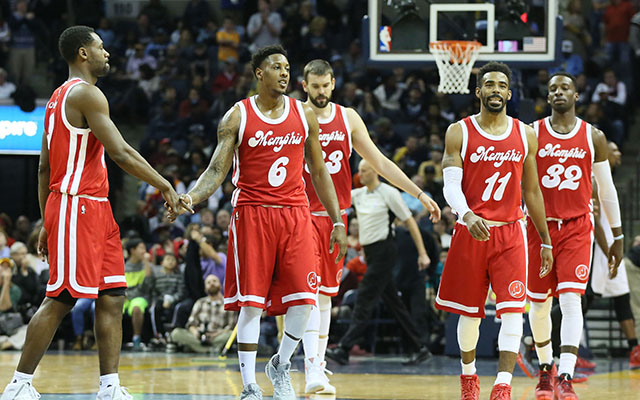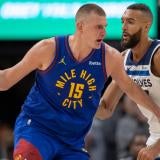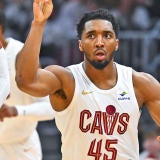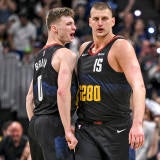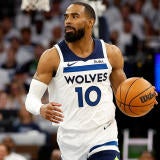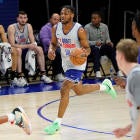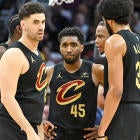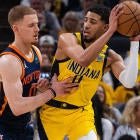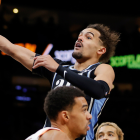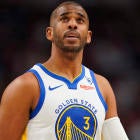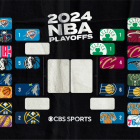The Memphis Grizzlies are a playoff team. The Memphis Grizzlies have been destroyed by the best teams in the league. The Memphis Grizzlies are trending in the right direction. The Memphis Grizzlies may not have enough options to make a run. The Memphis Grizzlies might look very different next year. The Memphis Grizzlies might look much the same.
All of these things are true, and it's all complicated and fascinating, beneath a team that was beaten by 50 by Golden State earlier this year. Here are ten things you need to know about the Grizzlies.
1. The Grizzlies have no intention of losing Mike Conley in free agency.
As you may have heard if you listen to sports talk radio anywhere near the greater New York City metropolitan area, point guard Mike Conley is a free agent this summer. Conley stands to make roughly twice as much as his $9.59 million salary this year, with an estimated $25.2 million starting figure for a max contract for a player of his experience (nine years in the league, explained here).
With the Grizzlies looking terrible every time they play a top-tier opponent (which coincides with every time they're on national television and exposed to casual fans outside of their market), there's a natural push from folks to start talking about the Grizzlies needing to trade Conley prior to a forced rebuild, "so they don't lose him and get nothing in return."
This, at least according to every single person I've queried on the subject, is not the plan. Plans change and things shift very quickly in the NBA, but it's at least not where Memphis intends to be.
General Manager Chris Wallace declined comment on the prospect of trading, or not trading, any particular player citing the complexities and often rapidly changing environment that exists within the NBA trade market. However, Wallace was willing to give, in no uncertain terms, what the Grizzlies' intentions are as of now regarding Conley.
"If you look back at the five years since the tide has turned for this franchise (since the 2011 playoff berth and the start of the "Grit-Grind" era)," Wallace told CBS Sports this week, "we have re-signed every core player for the Memphis Grizzlies."
Wallace is being truthful in this regard. The problem for markets like Memphis is often presented as being unable to sign marquee free agents. However, in that time span Wallace cited, the Grizzlies have re-signed or extended Marc Gasol twice, Zach Randolph twice, Tony Allen twice, and Mike Conley once. They kept Rudy Gay before trading him on a deal he's finishing up currently. There hasn't been a vital member of the franchise to walk. That deserves mentioning.
In my podcast with Conley, I asked him about how difficult it would be (on a scale of 1-10) to leave Marc Gasol in free agency, after pushing him very hard to re-sign last summer. (Gasol re-signed without meeting with another team on a five-year max deal.) Conley responded "An 11."
Gasol, for his part, says the decision "cannot be emotional" for Conley.
"He has to stay because he believes it's the best situation for him," Gasol told CBS Sports last week. "That's pretty much what it comes down to. He has to stay because it feels right, not because he feels like he owes me, or the city, or that it's the most comfortable thing to do. He has to stay because he believes in this and he feels like he's in control of what happens here. He's built it, and he's been a huge part of what's happened here, but that has to be why he makes the decision.
"Because when things turn and flip, and they want to get rid of you, nobody's going to look out for you. Those feelings are not reciprocated."
There's at least a chance that Conley gets to the end of this season and decides somewhere else would be his best fit. It would go against his personality, the Grizzlies' track record, financial sense, and a host of other factors, but it's definitely possible. That's just how frew agency is in the NBA.
2. The Grizzlies are trying to flip the franchise instead of tearing it down.
Let's stay on that Gasol quote for a minute, because while everyone's screaming for Memphis to "blow it up," they overlook what Memphis' actual rebuilding plan is. When Gasol says Conley has to feel like "he's in control of what happens here," that's a hint towards what the ideal plan is for Memphis. Instead of tanking out and hoping that you a) win the lottery and b) do so in a year with a transcendent star instead of, say, one in which Anthony Bennett and Victor Oladipo are the two best players, Memphis wants to reload around Gasol and Conley.
Gasol turned 31 on Friday, and while some have concerns about him sliding with age, approximately none of his advantage is based on athleticism or explosiveness. Gasol's not going to be a worse passer, a worse screener, his set shot won't deteriorate, and though his defense has slipped from his Defensive Player of the Year level three years ago, it's easy to forget that Gasol's defense is like pizza ... or whatever the Spanish version of pizza is. Even when it's bad, it's still pretty good.
Conley, on the other hand, is in his prime at age 28 with a half-decade of production around him. Put an even marginally competent team of veterans around those two and they're a playoff team, even if not a scary one. That's their floor.
Instead of tearing down the house and rebuilding it, think of this as flipping the house. Using what's there to make a better, more valuable house.
The timing is the tricky part. Memphis isn't done with Grit-Grind. A healthy Zach Randolph and Tony Allen have Memphis in a much better place (more on that in a minute), and the team won't go running towards a new era as long as that configuration -- which has a proven track record that extends as recently as pushing the Warriors to the brink of elimination last spring -- has any life left in it. It has to find a way to be ready to pivot when this run is over without damaging any flexibility.
Some would say that's already happened, that not only has the team fallen off as Randolph and Allen have gotten older (Memphis has the second-oldest average roster age at 29.5), but that their entire style has been rendered antiquated and gone the way of the dinosaur thanks to the new smallball, pace-and-space sensations that have swept the league.
Except, the funny thing is that when Memphis got back to that same, old, boring style everyone thinks is extinct, they started winning again.
3. The Grizzlies are back to what they do best.
So while Memphis was getting annihilated and wildly trying out new lineups, something slowly started to change. At first, the changes to the starting lineup were credited. When Zach Randolph went to the bench, it was "the end of Grit Grind." (Randolph returned to the starting lineup two weeks ago.) When Jeff Green was then sent to the bench and did not play in the second half vs. Houston on Jan. 12, the narrative became "Green's out of the rotation." (Green has averaged 17 points and five rebounds on 49 percent shooting in the last five games.)
Here's a simpler explanation for what has gone on with Memphis, and it involves two very simple facets: One encouraging, one cautionary.
The good news? Their top players are simply playing better. Something turned on Dec. 19 vs. the Pacers. The Grizzlies were coming off back-to-back losses and had only three victories a span of nine games. Then, they suddenly started playing better.
This chart shows how the Grizzlies played with two distinct pairings (Gasol-Conley and Randolph-Allen) on the floor. In gray is their net rating before Dec. 19, and in blue is their net rating after.

It turns out when their best players play together, the Grizzlies are much better. The team also rediscovered its defensive spark. They are eighth in defense in that span. Talking to the team (and wading through cliches), what it really comes down to is that for the second time in the Dave Joerger era, the Grizzlies tried to teach an old dog new tricks.
Conley mentioned the team was trying to speed things up and play with more pace while still playing defense, and that lineups were constantly shifting. Courtney Lee said the team had "gotten away" from what they do well. In short, it's become clear that the Grizzlies are unwilling, or, more likely, incapable of making major adaptations to their style and systems without major growing pains, which put them too far behind the 8-ball in the playoff race. Memphis re-asserted its approach and started focusing on the defensive end, and that's translated into better offensive opportunities.
The not-so-encouraging part? Look through the Grizzlies wins and losses since Dec. 19 and you'll notice something. No Golden State. No San Antonio. No Cleveland Cavaliers. Oklahoma City once, Houston once (both blowouts). However, it should be noted that the OKC loss, while definitive, was at least a 16-point loss vs. the 38-point loss it suffered earlier in the year.
4. There's a serious gap between Memphis and the elite teams in the league.
Before Memphis' victory against the Nuggets last week, coach Dave Joerger said that he has honestly stopped looking at the season-long stats for the Grizzlies to evaluate where they are. The multiple blowouts had simply nuked their stats too much. They lost to the Cavaliers by 30 on opening night, to the Warriors by 50 a few nights later, to the Thunder by 38 later on, and to the Hornets by 24. Of the 20 Memphis losses, 10 have come by 15 points or more.
Memphis hasn't just struggled to beat the elite teams, they've struggled to even grab the bumper while those teams run over them. They haven't scuffed the paint on the truck that has made them roadkill so often this year. So while this run where they've played better and won 12 of 18 is nice, there's still no reason to think that when May rolls around they're suddenly going to be able to score with the elite teams.
But maybe they don't need to. The good organizations in the NBA turn down years into opportunities to retool, not rebuild, to reconfigure, not blow it up. Kevin Lipe of the Memphis Flyer broke this down earlier this year, and it's starting to look a lot more like that. Memphis has cap space coming in the near future, though the reason for that is due to Courtney Lee and Jeff Green's contracts expiring along with Conley's, all of whom they'll need to keep or replace in some fashion. Their picks are compromised due to prior trades, but if they make the playoffs, they retain it this year. There will be chances to alter this team, the questions are more about which direction they'll go.
As for this year, one of the most simultaneously encouraging and discouraging facets of the team's chances is that they lie heavily with the play of Green.
5. Jeff Green can swing their fortunes, and that's a problem.
Here's a stat for you. Green has finished with a positive plus/minus in 21 games this season. The Grizzlies have won 19 of those games. Memphis wins 90 percent of its games when Green has a positive plus/minus. Now, some of this is obvious, right? When players play well, they outscore the opposition and win the game. This is not surprising. But for Green to be such a net negative for Memphis (he has a negative on vs. off rating per 100 possessions) and for them to perform so well when he's a contributor says a lot. You would expect Matt Barnes to be a guide for how Memphis does (they haven't lost a game when Barnes is in the positive), and you would expect for Gasol to be pivotal to their success (Memphis has only won five games when Gasol has a negative plus/minus).
But if Green is as bad as he's made out to be, his numbers should be random and unhelpful. He should be in the positive in blowouts or negative in huge wins. And instead it's fairly consistent: When Green plays well, Memphis wins. You can say that's going to be true for any key rotation player, but with Green being such a divisive, and at times frustrating player, it's particularly true.
Green often opts for shots that aren't quality looks a lot of times, as he did vs. Denver. This is the kind of stuff that drives fans crazy, when Green tries to put the offense on his back.
However, what's interesting is that Green is a really effective on-ball player. He's in the 79th percentile in the pick-and-roll as the ball-handler and in the 75th percentile in isolation, according to Synergy Sports. He's also in the 63th percentile in the post.
His problem, along with all of Memphis', is that he simply straight up cannot hit on spot-up shots.
6. The Grizzlies have ZERO RANGE.
Memphis is 23rd in catch-and-shoot shots per NBA.com, 23rd in corner 3-pointer percentage, and 24th from above-the-break. One of the key issues is that the Grizzlies' spacing is a nightmare, and that's further complicated by the fact that teams are anticipating the throw to the weakside corner when Gasol is doubled. Watch Khris Middleton anticipate and spring to the corner here:
Then there's this:

This is the core of the entire offensive struggle. They don't have a shooter who can create his own shot on the perimeter outside of Conley, they don't have shooters with releases quick enough to get the shot off if they do find a quick look, and teams are anticipating everything when they bring the double. Some off-ball movement on the weak side would clear a shooter, but instead, Memphis' guys just stand and wait holding giant neon signs that say "I'm looking for a spot-up shot, please run me off."
It's a problem.
7. JaMychal Green needs to play more.
Not a lot of people know who JaMychal Green is. He's 25, spent a cup of coffee with the Spurs two years ago, hung with Memphis in spot time last year, and had been on track for a substantial uptick, until Dave Joerger started playing Ryan Hollins more this week, which is a complete and total disaster.
Green mostly plays with the end of the bench lineups. The defense is slightly better with him on-court, the offense just slightly worse. But it's his skillset that's really intriguing. Green's long, athletic and smooth. More importantly, he's worked on developing a 3-pointer and on just 17 attempts this year has hit nine, including more lately.
Watch this and tell me if this isn't exactly what the Grizzlies need:
This could change in a playoff series where teams adapt and actually, you know, pay attention. But for a team that struggles with spacing and needs someone, anyone to hit a spot-up shot, Green's a weapon that Memphis needs to explore using more.
8. Memphis has made efforts to modernize its approach.
One of the Grizzlies' problems has been a lack of young talent. They do have five players under the age of 26 -- nearly a third of the team -- on the roster, but they don't play much. Jordan Adams is still recovering from knee surgery, they're hopeful he can get some work in by the end of the year but this is basically a lost season for him. Jarell Martin is spending time with the Grizzlies' D-League affiliate, which Memphis has put more resources into using as a true development system. They're doing the same with James Ennis who they acquired in the Mario Chalmers deal for Jarnell Stokes and Beno Udrih.
Stokes was a disappointing player to get rid of, with his toughness and upside as a super-active four in this league. But he hadn't demanded minutes, and in the end, Memphis valued a quality backup point guard in Chalmers over another big to try and find minutes for.
Memphis has also instituted using Catapult technology which is a body sensor that tracks fatigue and wear and tear through movement. Yet, you still see Gasol and the other key players playing heavy minutes. In short, Memphis has put money and resources towards building a smarter infrastructure, but they're just not in a great position to actually utilize most of it at this point.
9. Gasol got rid of his giant terrifying jacket.
The one thing I've noticed about Gasol over the past three years was that any time he was traveling in winter, he would wear this gigantic black leather trench coat. Try and imagine this bearded, seven-foot mountain of a man wandering around in a black leather trench coat. Apparently, that coat has gone by the wayside, which you have to wonder is the product of his getting married within the last few years.
10. Their P.A. guy is awesome.
For a team named "The Grizzlies," they have the perfect P.A. announcer in Rick Trotter, profiled here by SB Nation. Trotter's not for everyone. Some prefer the dulcet (in my opinion, woefully boring) tones of Lawrence Tanter in L.A. who sounds like he's letting you know you left the lights of your PT Cruiser on. Some don't want an over-the-top PA guy, they like things more reserved. For the Grizzlies, however, it's perfect. You need someone growling out what's going on on court, and it adds to the "Grindhouse" feel of FedEx Forum. You can follow Trotter on Twitter.
Bonus: The "Sounds" jerseys are so good, they need to adopt them full time. Getting rid of the "Grizzlies" moniker would be expensive and upsetting to a lot of fans, but it fits the town a lot better given its wonderful and extensive musical history from Elvis to Stax and everything in between. And let's face it, the jerseys are straight fire.
